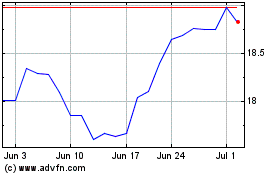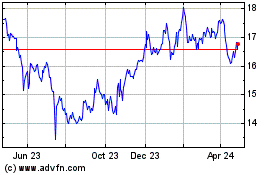By Joe Flint, Drew FitzGerald and Alexandra Bruell
Last month, comedian Samantha Bee used a vulgarity to describe
Ivanka Trump on her TBS show. It was bleeped on air, but ran
online, and set off a scramble inside Time Warner Inc., the
network's parent company.
Advertisers pulled out. Ms. Bee apologized. Time Warner Chief
Executive Jeff Bewkes was furious. The comedian's defenders argued
that stars on sister channel HBO get to cross lines all the time,
people familiar with the matter said. In the end, Ms. Bee wasn't
suspended.
Congratulations, AT&T Inc., now all this is yours. The
telecom giant this week defeated the government in a landmark
antitrust case that all but secures its $80 billion takeover of
Time Warner. That legal odyssey may soon seem like a breeze
compared to what comes next -- delivering on the promise of the
deal.
A major challenge will be integrating a staid phone company with
an entertainment behemoth filled with larger-than-life
personalities. AT&T will have to reconcile its culture, where
all but nine top executives usually fly coach, with Time Warner's
Hollywood lifestyle, where most vice presidents and above fly
business class and airport greeters are common, according to people
familiar with the companies' travel policies.
What was once Ma Bell will have to stomach huge spending on
content, knowing that flops are a fact of life in Hollywood. And,
as in the case of Ms. Bee, it will have to decide where to draw the
line.
"AT&T will need to demonstrate it can effectively manage a
media business," said Mike White, the former chief executive of
DirecTV, the satellite broadcaster that AT&T acquired in 2015.
"That means, in particular, retaining key talent and encouraging a
culture of innovation."
The companies said they look forward to closing the deal on or
before their agreed-upon June 20 deadline. The government could
throw a wrench in the process by appealing federal judge Richard
Leon's decision in AT&T's favor, though he warned the
government against trying that tactic in an unusually blunt
opinion.
AT&T has pledged to reinvent TV advertising and challenge
Facebook Inc. and Google in winning marketing budgets. It has
considered selling ad space on channels such as TNT and CNN in a
new way, targeting different households with different ads,
according to remarks by company executives at the trial.
Rather than running an ad for an arthritis drug for an entire
audience, a young family might see a diaper ad, while a single man
nearby might see videogame ads. AT&T would marshal the
anonymized data it keeps on millions of wireless users -- including
their viewing habits and locations -- to help target the ads and
then see if people went somewhere or purchased something after
seeing them.
There are major hurdles standing in the way of this strategy,
including the possibility it could cannibalize national advertising
revenue and require cooperation from rival pay-TV distributors that
is unlikely to be forthcoming, people familiar with the plans
say.
AT&T is also trying to gain ground in a marketplace battle
to win over cord-cutters who are dropping cable and satellite
services including its own DirecTV. It is planning to release a
roughly $15-a-month bundle of channels, including Turner's CNN, TNT
and TBS, which doesn't include sports networks. The service would
come with an app preloaded on AT&T Wireless customers'
smartphones. That is an aggressive price in an industry where
roughly $40 is the norm for a "skinny" bundle.
The man who has been tapped to run Time Warner for AT&T is
John Stankey, a 32-year company veteran. He climbed the ranks of
the phone giant and ran its giant landline business before leading
the company's acquisition of DirecTV in 2015.
A towering executive with a deep voice and an intimidating
presence, Mr. Stankey isn't well-known in media circles. He will be
dealing with high-profile and better-paid underlings at Time
Warner. Mr. Stankey made $10 million in 2017, according to an
AT&T securities filing, far below the compensation packages of
the heads of Time Warner's HBO, Warner Bros. and Turner, according
to people familiar with the matter.
Mr. Stankey, a daily presence during the antitrust trial, is
expected to make the rounds in coming days with Time Warner's
leadership. He is meeting with top Turner executives this week in
New York, a person familiar with the situation said.
Last year at a gathering of media industry leaders hosted by the
boutique investment bank Lion Tree, Mr. Stankey acknowledged "we've
got one of the more complex management tasks of any organized
entity sitting in front of us," according to a person in
attendance.
Mr. Stankey said AT&T wouldn't be allergic to spending money
on the right project. "We're not going to screw up a
hundred-billion dollar transaction for want of a billion dollars of
investment," he said.
Inside Time Warner, executives have expressed concern that a
fast-paced creative culture could be stymied by a telephone company
unfamiliar with the idiosyncrasies of making and marketing movies
and television.
"There was a sense of a much more intense bureaucracy" at
AT&T, said one Time Warner executive who was involved in
transition planning with AT&T. "Small decisions require
multiple conversations."
AT&T has already signaled it may get involved in the
creative process. Executives have proposed using specific data on
what kinds of viewers are watching shows, and how much time they
spend doing so, to help decide what programming is worth the
investment.
"Neither company today has the wherewithal to actually execute
around using data analytics to help inform the creative process,"
Mr. Stankey testified during the trial, referring to AT&T and
Time Warner. "There will be more information coming after the
business is combined and the reality is that people are going to
have to learn new tricks."
AT&T's takeover of DirecTV is the closest blueprint Time
Warner has for what may lie ahead. After AT&T assumed control,
it combed through the executive ranks and gave many people new,
less-impressive titles and lower salaries.
"It's not a great morale booster or incentive," said one former
DirecTV executive who took the pay and title cut. "They would tell
you you're great, but they are very stingy."
The lavish perks that often go hand-in-hand with the
entertainment industry -- fancy offices, multiple assistants,
travel benefits -- are also expected to eventually go under the
microscope.
"If you get to the airport early and get a Coke, that is on your
dime," one person familiar with AT&T's travel policy said.
At Warner Bros., the expense policy is more generous and many
executives get greeters when they arrive and depart from the
airport to speed them through security, people who know its
policies say.
The political leanings of the companies' staff also differ.
AT&T employees and affiliates' political contributions totaled
$11.7 million, about two-thirds of which went to GOP candidates,
during the 2016 election cycle, according to OpenSecrets, part of a
nonprofit research group. Time Warner's contributions reached $2.4
million, 87% of it to Democrats.
As AT&T will soon learn, running a media company comes with
plenty of gut-check moments that have no rulebook.
The incident involving Ms. Bee on her show, "Full Frontal,"
caught top Time Warner executives by surprise. Her statement
describing Ms. Trump with a vulgar term for female anatomy came as
part of a monologue criticizing her father, President Donald Trump,
for a policy that separated migrant children from their parents at
the border.
Lawyers at Turner, the unit that oversees cable channels
including TBS, suggested not using the line, but a programming
executive assigned to the show said censoring it with a "bleep"
would be fine, according to an executive familiar with the matter.
No one took the discussion further up the food chain, the executive
said.
In another high-profile decision, CNN fired comedian Kathy
Griffin last year from its New Year's Eve program after she
appeared in a photo holding a faux bloody severed head of President
Trump.
Just before Ms. Bee's performance, AT&T's chief executive,
Randall Stephenson, gave some indication of how he might respond to
such incidents. He was asked at the Code Conference, a gathering of
media and tech executives, about the decision of Walt Disney Co. to
cancel ABCs "Roseanne" after its star made a racist tweet about a
former aide to President Barack Obama. Mr. Stephenson replied,
"that is a no-brainer, right?"
President Trump has consistently attacked Time Warner's CNN
cable channel. During and after the 2016 presidential campaign, his
aides complained privately to top Time Warner executives about
negative coverage and the makeup of expert panels, The Wall Street
Journal reported.
AT&T and Time Warner executives believed that one of the
reasons for the government's suit to block the deal was President
Trump's aversion to CNN, people close to the situation have said.
Both the White House and the Department of Justice have denied any
such motivation.
AT&T has said it wouldn't interfere with CNN's editorial
independence. CNN President Jeff Zucker's contract was recently
extended through the end of 2020 by current Turner management, a
person familiar with the situation said. People close to CNN and
familiar with AT&T's thinking believe Mr. Zucker is secure.
AT&T itself was embarrassed last month when news broke that
it had retained Michael Cohen, a personal attorney and fixer to Mr.
Trump, as a political consultant, paying him $600,000.
Mr. Stephenson said the hiring was a "big mistake" that damaged
AT&T's reputation, and he forced out the head of the company's
Washington, D.C., operations. That decision came after large
investors called the CEO urging him to put the controversy to rest,
according to a person familiar with the matter.
Mr. Stankey, the AT&T executive who will oversee Time
Warner, is seen by people who have sat across the table from him as
having the right temperament for the job.
"He's calm and deliberate," said David Zaslav, chief executive
of cable programming giant Discovery Inc. Mr. Zaslav said he
doesn't expect Mr. Stankey to weigh in on programming decisions but
will instead focus on the big picture.
"He's not the guy who figures out who to cast in your drama,"
but will be a "creative leader" who can fuse quality content with
AT&T's mobile phone operation, Mr. Zaslav said.
John Martin, the chief executive of Turner, is expected to leave
the company, in part because Mr. Stankey plans to be more hands-on
than Mr. Bewkes.
Write to Joe Flint at joe.flint@wsj.com, Drew FitzGerald at
andrew.fitzgerald@wsj.com and Alexandra Bruell at
alexandra.bruell@wsj.com
(END) Dow Jones Newswires
June 13, 2018 18:20 ET (22:20 GMT)
Copyright (c) 2018 Dow Jones & Company, Inc.
AT&T (NYSE:T)
Historical Stock Chart
From Mar 2024 to Apr 2024

AT&T (NYSE:T)
Historical Stock Chart
From Apr 2023 to Apr 2024
